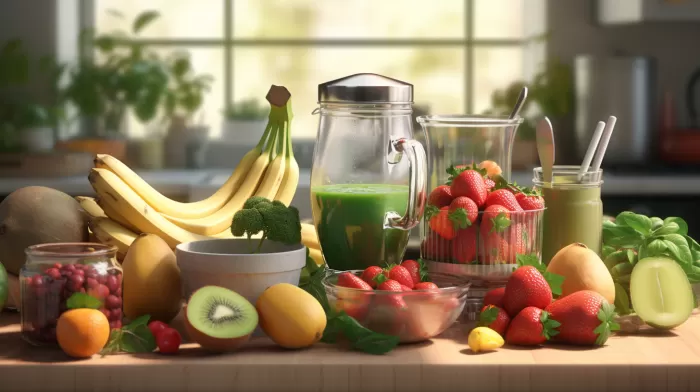Juicing and smoothies have become popular ways to ensure you get essential nutrients quickly and efficiently. Research published in the Journal of Epidemiology and Community Health shows that increasing your daily servings of vegetables and fruits can even increase your life span. Eating seven servings of vegetables a day can lower the overall risk of death by 42 percent, while eating just one serving daily can lower the risk by 12 to 15 percent.
To begin incorporating juices and smoothies into your diet, you’ll need a blender or juicer. While high-powered models can be expensive, there are also budget-friendly options like compact bullet-style mixers, stand blenders, or hand blenders. Look for power above 500 to 600 watts if you want to blend tough nuts and leafy vegetables.
Here are some additional tips for getting started:
- Blend leafy greens and liquid base first to avoid chunks.
- Defrost frozen fruit overnight to soften it for blending.
- If the motor seems stuck, add more liquid to get the contents moving.
Ready to start blending? Check out these easy three-ingredient smoothie recipes from food author Jessica Seinfeld. Each recipe serves one, and you can pack the ingredients in bags ahead of time for convenient meal prep throughout the week.
Strawberry, Yogurt, and Coconut
- 8 frozen strawberries
- ½ cup plain yogurt or kefir
- ½ cup shredded, unsweetened coconut
Not only are strawberries delicious, but they also support heart health. Plain yogurt or kefir promote healthy digestion, and coconut can improve cholesterol levels.
Kale, Pineapple, and Yogurt
- ½ cup frozen kale
- ½ cup frozen pineapple
- ½ cup plain yogurt or kefir
- (¼ cup water)
Kale is a nutrient powerhouse, boasting vitamin C, omega-3 and omega-6 fatty acids, fiber, vitamin A, and vitamin K. Pineapple is an anti-inflammatory fruit that contains vitamin C, folates, and potassium.
Banana, Peanut Butter, and Cacao Powder
- 1 peeled frozen banana
- 2 tablespoons of natural peanut or almond butter
- 2 tablespoons of cacao powder
- (¼ cup of water)
Bananas are high in potassium, while natural peanut butter is a good source of protein and heart health booster.
Mango, Coconut Milk, and Chia Seeds
- 8 pieces of frozen mango (about ¾ cup)
- ½ cup coconut milk
- 1 tablespoon of chia seeds
Mango is an excellent source of antioxidants, boosting eye and skin health and potentially helping to lower cholesterol. Chia seeds aid in healthy digestion.
Green Apple, Spinach, and Ginger
- 1 green apple, peeled and cored
- ½ cup frozen spinach
- ½-inch piece of peeled fresh ginger (cut into small pieces)
- (½ cup of water)
Apples contain high levels of antioxidants, supporting heart health, improving blood sugar levels, and aiding in disease prevention. Spinach is full of vitamins and minerals to improve eye health and build strong bones.
Blueberries, Almond Butter, and Almond Milk
- ¾ cup frozen blueberries
- 1 tablespoon of natural almond butter
- ½ cup unsweetened almond milk
Blueberries provide antioxidants to help eliminate free radical damage. Almond milk, derived from almond nuts, offers the same health benefits and is an excellent source of protein, vitamin E, minerals, and cholesterol-lowering properties.
Banana, Kale, and Coconut Water
- 1 peeled frozen banana
- ½ cup frozen kale
- ½ cup coconut water
Orange, Red Bell Pepper, and Coconut Oil
- 1 red bell pepper, quartered and seeded
- 1 peeled naval orange
- 1 tablespoon of coconut oil
Oranges packed with vitamin C help fight free radical damage, and other nutrients fight inflammation. Red peppers are loaded with antioxidants like vitamins C and A, lycopene, and vitamin B.
These simple recipes not only taste incredible but also make it easy to add nutritious and wholesome ingredients to your diet. Start blending and enjoy the many health benefits of these delicious smoothies.



